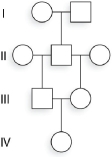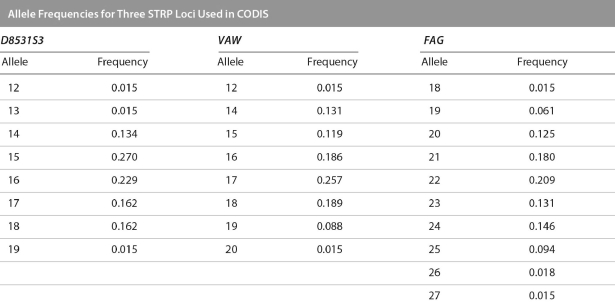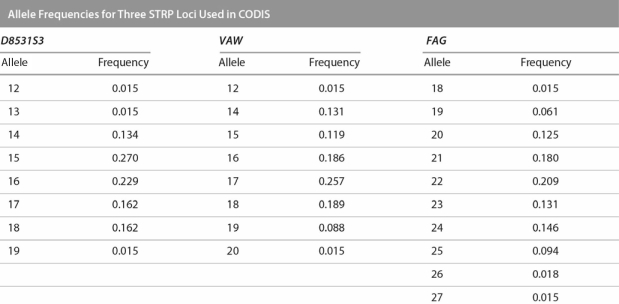Deck 22: Population Genetics and Evolution
Question
Question
Question
Question
Question
Question
Question
Question
Question
Question
Question
Question
Question
Question
Question
Question
Question
Question
Question
Question
Question
Question
Question
Question
Question
Question
Question
Question
Question
Question
Question
Question
Question
Question
Question
Question
Question
Question
Question
Question
Question
Question
Question
Question
Question
Question
Question

Unlock Deck
Sign up to unlock the cards in this deck!
Unlock Deck
Unlock Deck
1/47
Play
Full screen (f)
Deck 22: Population Genetics and Evolution
1
Which aspect of population genetics can lead to changes in allele frequencies in a new mixed population following migration?
A)natural selection
B)mutation
C)gene flow
D)founder effect
E)bottleneck effect
A)natural selection
B)mutation
C)gene flow
D)founder effect
E)bottleneck effect
C
2
Which aspect of population genetics refers to chance fluctuations of allele frequencies resulting from sampling error and is more prominent in small, isolated populations?
A)founder effect
B)mutation
C)gene flow
D)gene drift
E)bottleneck effect
A)founder effect
B)mutation
C)gene flow
D)gene drift
E)bottleneck effect
D
3
The coefficient of inbreeding (F)can be used to estimate the proportion of loci that are __________.
A)fixed in a population
B)homozygous identical by descent
C)heterozygous by descent
D)lethal alleles
E)recessive
A)fixed in a population
B)homozygous identical by descent
C)heterozygous by descent
D)lethal alleles
E)recessive
B
4
Phenylketonuria (PKU)is extremely common in Ireland, affecting approximately 1 in 4500 live births. Assuming that the population is in Hardy-Weinberg equilibrium, what is the frequency of PKU carriers?
A)0.022%
B)98.5%
C)2.9%
D)1.49%
E)2.2%
A)0.022%
B)98.5%
C)2.9%
D)1.49%
E)2.2%

Unlock Deck
Unlock for access to all 47 flashcards in this deck.
Unlock Deck
k this deck
5
All Old Order Amish families from Lancaster County with Ellis-van Creveld syndrome can trace their genealogies to Mr. and Mrs. Samuel King, who immigrated to Lancaster County in 1744. This is an example of __________.
A)founder effect
B)mutation
C)gene flow
D)Hardy-Weinberg equilibrium
E)bottleneck effect
A)founder effect
B)mutation
C)gene flow
D)Hardy-Weinberg equilibrium
E)bottleneck effect

Unlock Deck
Unlock for access to all 47 flashcards in this deck.
Unlock Deck
k this deck
6
Which of the following is an example of a postzygotic mechanism for reproductive isolation?
A)behavioral isolation
B)gametic isolation
C)habitat separation
D)mechanical isolation
E)hybrid sterility
A)behavioral isolation
B)gametic isolation
C)habitat separation
D)mechanical isolation
E)hybrid sterility

Unlock Deck
Unlock for access to all 47 flashcards in this deck.
Unlock Deck
k this deck
7
If an X-linked recessive trait has a frequency of 5% in males, what percentage of females are carriers? (Assume that the population is in Hardy-Weinberg equilibrium.)
A)9.5%
B)5%
C)95%
D)4.2%
E)10%
A)9.5%
B)5%
C)95%
D)4.2%
E)10%

Unlock Deck
Unlock for access to all 47 flashcards in this deck.
Unlock Deck
k this deck
8
What type of statistical analysis is used to compare observed and expected results in order to evaluate the validity of an estimate based on the Hardy-Weinberg equilibrium?

Unlock Deck
Unlock for access to all 47 flashcards in this deck.
Unlock Deck
k this deck
9
Given the following pedigree, what is the coefficient of inbreeding for individual IV-1? 
A)1/2
B)1/4
C)1/8
D)1/16
E)1/64

A)1/2
B)1/4
C)1/8
D)1/16
E)1/64

Unlock Deck
Unlock for access to all 47 flashcards in this deck.
Unlock Deck
k this deck
10
Physical separation of a segment of a large population by a physical barrier that prevents gene flow can lead to __________.
A)sympatric speciation
B)allopatric speciation
C)hybrid sterility
D)temporal isolation
E)gene flow
A)sympatric speciation
B)allopatric speciation
C)hybrid sterility
D)temporal isolation
E)gene flow

Unlock Deck
Unlock for access to all 47 flashcards in this deck.
Unlock Deck
k this deck
11
You want to calculate the frequency of the allele causing sickle cell disease in your patients, and you know the genotypes of every individual. Assuming the population is not in Hardy-Weinberg equilibrium due to population substructure, which method can be used to calculate allele frequency?
A)allele-counting method
B)genotype proportion method
C)square root method
D)binomial expansion
E)chi-square test
A)allele-counting method
B)genotype proportion method
C)square root method
D)binomial expansion
E)chi-square test

Unlock Deck
Unlock for access to all 47 flashcards in this deck.
Unlock Deck
k this deck
12
In a group of 500 people, the frequency of genotype NN is 40%. Assuming both autosomal inheritance and that the population is in Hardy-Weinberg equilibrium, how many individuals would you expect to have the MN genotype?
A)68
B)232
C)300
D)200
E)258
A)68
B)232
C)300
D)200
E)258

Unlock Deck
Unlock for access to all 47 flashcards in this deck.
Unlock Deck
k this deck
13
Cheetahs exhibit significant inbreeding and loss of heterozygosity due to overhunting and loss of habitat experienced at some point in their evolutionary history. Which genetic mechanism occurs when a large population is substantially reduced at random, acting independently of natural selection?
A)founder effect
B)mutation
C)gene flow
D)Hardy-Weinberg equilibrium
E)bottleneck effect
A)founder effect
B)mutation
C)gene flow
D)Hardy-Weinberg equilibrium
E)bottleneck effect

Unlock Deck
Unlock for access to all 47 flashcards in this deck.
Unlock Deck
k this deck
14
Given the following genetic profile, what is the mean fitness of the population? Genotype A1A1 A1A2 A2A2
Frequency 0.55 0.20 0.25
Number 2750 1000 1250
Relative fitness (w)1.0 0.75 0.50
A)1
B)0.75
C)0.825
D)0.3025
E)0.55
Frequency 0.55 0.20 0.25
Number 2750 1000 1250
Relative fitness (w)1.0 0.75 0.50
A)1
B)0.75
C)0.825
D)0.3025
E)0.55

Unlock Deck
Unlock for access to all 47 flashcards in this deck.
Unlock Deck
k this deck
15
Mexican hairless dogs are heterozygous (Hh), carrying a single copy of the recessive lethal allele. In a given population, the Hh genotypic frequency is 60% and the frequency of each homozygote
Is 20%. Assuming w = 1 for the Hh and hh dogs, what is the estimated genotypic frequency of the lethal HH genotype after reproduction?
A)20%
B)14%
C)10%
D)39%
E)46%
Is 20%. Assuming w = 1 for the Hh and hh dogs, what is the estimated genotypic frequency of the lethal HH genotype after reproduction?
A)20%
B)14%
C)10%
D)39%
E)46%

Unlock Deck
Unlock for access to all 47 flashcards in this deck.
Unlock Deck
k this deck
16
In CODIS, what type of genetic marker is used to predict population genotype frequencies?
A)dsRNAs
B)PCR products
C)CpG islands
D)STRPs
E)FISH chromosome patterns
A)dsRNAs
B)PCR products
C)CpG islands
D)STRPs
E)FISH chromosome patterns

Unlock Deck
Unlock for access to all 47 flashcards in this deck.
Unlock Deck
k this deck
17
When populations share a single habitat but are isolated by genetic or postzygotic mechanisms that prevent gene flow, what process can cause populations to diverge?
A)random mating
B)allopatric speciation
C)sympatric speciation
D)random mutation
E)gene duplication
A)random mating
B)allopatric speciation
C)sympatric speciation
D)random mutation
E)gene duplication

Unlock Deck
Unlock for access to all 47 flashcards in this deck.
Unlock Deck
k this deck
18
In the same population of patients you examined for sickle cell allele frequencies, you now want to test whether the disease symptoms are related to blood type. Since blood type is a codominant trait and the alleles are easily identifiable by the phenotype (blood type)of the individuals, which method is most helpful for identifying blood type allele frequency?
A)allele-counting method
B)genotype proportion method
C)square root method
D)binomial expansion
E)chi-square test
A)allele-counting method
B)genotype proportion method
C)square root method
D)binomial expansion
E)chi-square test

Unlock Deck
Unlock for access to all 47 flashcards in this deck.
Unlock Deck
k this deck
19
Both the founder effect and the bottleneck effect are mechanisms that produce large allele frequency sampling errors in a small population due to __________.
A)random mutation
B)gene flow
C)gene drift
D)lethal alleles
E)random mating
A)random mutation
B)gene flow
C)gene drift
D)lethal alleles
E)random mating

Unlock Deck
Unlock for access to all 47 flashcards in this deck.
Unlock Deck
k this deck
20
The process by which an original species is transformed into a new species over an extended period of time that spans many generations is known as __________.
A)anagenesis
B)cladogenesis
C)morphogenesis
D)neogenesis
E)founder effect
A)anagenesis
B)cladogenesis
C)morphogenesis
D)neogenesis
E)founder effect

Unlock Deck
Unlock for access to all 47 flashcards in this deck.
Unlock Deck
k this deck
21
Of the five aspects of Hardy-Weinberg equilibrium, which one directly affects phenotypic frequencies for both rather than genotypic frequencies?

Unlock Deck
Unlock for access to all 47 flashcards in this deck.
Unlock Deck
k this deck
22
Using the allele frequencies in the table below, what is the probability that a random person would be heterozygous 12/14 for VAW? 


Unlock Deck
Unlock for access to all 47 flashcards in this deck.
Unlock Deck
k this deck
23
When examining the effects of forward and reverse mutation rates, what equation is used to calculate the change in the frequency of A2, or Δq?

Unlock Deck
Unlock for access to all 47 flashcards in this deck.
Unlock Deck
k this deck
24
In a theoretical population where f (A1)= 0.95 and f (A2)= 0.05, µ = 1 × 10-6, and v = 1 × 10-7, what is Δq?

Unlock Deck
Unlock for access to all 47 flashcards in this deck.
Unlock Deck
k this deck
25
Inbreeding depression, the reduction in fitness of inbred organisms, often results from the reduced level of what (within the gene pool)?

Unlock Deck
Unlock for access to all 47 flashcards in this deck.
Unlock Deck
k this deck
26
If the genotype frequency in an admixed population is f (A1)= 0.75, what is the genotypic frequency of heterozygotes in the admixed population?

Unlock Deck
Unlock for access to all 47 flashcards in this deck.
Unlock Deck
k this deck
27
If the frequency of PKU (an autosomal recessive disease)is 1%, what percentage of the population are completely unaffected (homozygous dominant or carrier)?

Unlock Deck
Unlock for access to all 47 flashcards in this deck.
Unlock Deck
k this deck
28
If the relative fitness value is w = 0.6, what is the selection coefficient used to identify the differences between the fitnesses of organisms with different traits?

Unlock Deck
Unlock for access to all 47 flashcards in this deck.
Unlock Deck
k this deck
29
Using the allele frequencies in the table below, what is the probability that a random person who was heterozygous 12/14 for VAW would also be homozygous 18/18 for FAG? (Assume that the two loci are unlinked.) 


Unlock Deck
Unlock for access to all 47 flashcards in this deck.
Unlock Deck
k this deck
30
If the frequency of PKU, an autosomal recessive disease, is 1% in males, what is the frequency of females with PKU? (You may assume that the population is in Hardy-Weinberg equilibrium.)

Unlock Deck
Unlock for access to all 47 flashcards in this deck.
Unlock Deck
k this deck
31
If the frequency of hemophilia, an X-linked recessive disease, is 10% in males, what is the frequency of carriers in the population (both males and females)?

Unlock Deck
Unlock for access to all 47 flashcards in this deck.
Unlock Deck
k this deck
32
What is the ultimate source of genetic variation in populations?

Unlock Deck
Unlock for access to all 47 flashcards in this deck.
Unlock Deck
k this deck
33
When looking at the MN blood group with three alleles, how many degrees of freedom will be used to compare observed versus expected results?

Unlock Deck
Unlock for access to all 47 flashcards in this deck.
Unlock Deck
k this deck
34
A difference in allelic frequencies that is produced when a new population is established by a few individuals is known as what type of genetic drift?

Unlock Deck
Unlock for access to all 47 flashcards in this deck.
Unlock Deck
k this deck
35
Which mechanism maintains the biological ability of populations to interbreed and can thus prevent evolutionary divergence of populations?

Unlock Deck
Unlock for access to all 47 flashcards in this deck.
Unlock Deck
k this deck
36
What are the two most common types of nonrandom mating?

Unlock Deck
Unlock for access to all 47 flashcards in this deck.
Unlock Deck
k this deck
37
________ is an evolutionary mechanism that favors the reproductive success of certain members of a population over others as a result of differences in anatomical, physiological, or behavioral traits they possess.

Unlock Deck
Unlock for access to all 47 flashcards in this deck.
Unlock Deck
k this deck
38
If the frequency of hemophilia, an X-linked recessive disease, is 10% in males, what is the frequency of females with hemophilia (assuming that the population is in Hardy-Weinberg equilibrium)?

Unlock Deck
Unlock for access to all 47 flashcards in this deck.
Unlock Deck
k this deck
39
If the heterozygous genotype is favored (as exhibited by the sickle cell allele in malaria-prone regions), selection results in a ________ in which alleles reach stable equilibrium frequencies that are maintained by the ongoing action of selection against the homozygous genotypes.

Unlock Deck
Unlock for access to all 47 flashcards in this deck.
Unlock Deck
k this deck
40
Which two molecular techniques are used in DNA profiling to generate data included in the FBI's CODIS database?

Unlock Deck
Unlock for access to all 47 flashcards in this deck.
Unlock Deck
k this deck
41
The coefficient of inbreeding quantifies the probability that two alleles in a homozygous individual are ________, having descended from the same copy of the allele carried by a common ancestor of the inbred individual.

Unlock Deck
Unlock for access to all 47 flashcards in this deck.
Unlock Deck
k this deck
42
In the general population, 1 in 300 individuals is a carrier for Tay-Sachs disease, while 1 in 30 individuals of Ashkenazi Jew descent are carriers. Tay-Sachs also affects 1 in 30 individuals with French-Canadian ancestry, although two completely unique mutations are responsible for the Ashkenazi and French-Canadian mutations. What are the chances of two individuals who are carriers having a child with Tay-Sachs if
a. both individuals are not of Ashkenazi or French-Canadian descent?
b. one individual is of Ashkenazi descent and one is not?
c. both individuals are of Ashkenazi descent?
a. both individuals are not of Ashkenazi or French-Canadian descent?
b. one individual is of Ashkenazi descent and one is not?
c. both individuals are of Ashkenazi descent?

Unlock Deck
Unlock for access to all 47 flashcards in this deck.
Unlock Deck
k this deck
43
The pattern of species evolution known as ________ is one of branching in which an ancestral species gives rise to two or more new species.

Unlock Deck
Unlock for access to all 47 flashcards in this deck.
Unlock Deck
k this deck
44
Forward and reverse mutation can create a ________, given a sufficient number of generations and the absence of other evolutionary processes.

Unlock Deck
Unlock for access to all 47 flashcards in this deck.
Unlock Deck
k this deck
45
What are the three key elements for determining F, a measure that a particular allele is IBD, using pedigree analysis?

Unlock Deck
Unlock for access to all 47 flashcards in this deck.
Unlock Deck
k this deck
46
Explain why rare recessive alleles are more likely to produce a recessive phenotype as a result of inbreeding.

Unlock Deck
Unlock for access to all 47 flashcards in this deck.
Unlock Deck
k this deck
47
In an island population, the frequencies of the three MN blood types are given here:
M: 550
MN: 725
N: 225
a. Calculate the allele frequency of M and N.
b. Assuming random mating, what are the expected frequencies for each blood type?
c. Use chi-square analysis to test your hypothesis that mating is random for this population.
M: 550
MN: 725
N: 225
a. Calculate the allele frequency of M and N.
b. Assuming random mating, what are the expected frequencies for each blood type?
c. Use chi-square analysis to test your hypothesis that mating is random for this population.

Unlock Deck
Unlock for access to all 47 flashcards in this deck.
Unlock Deck
k this deck


